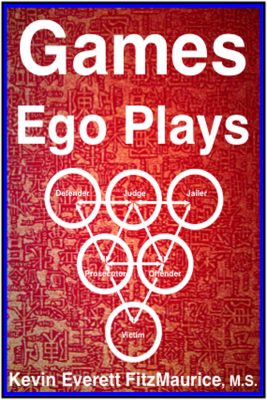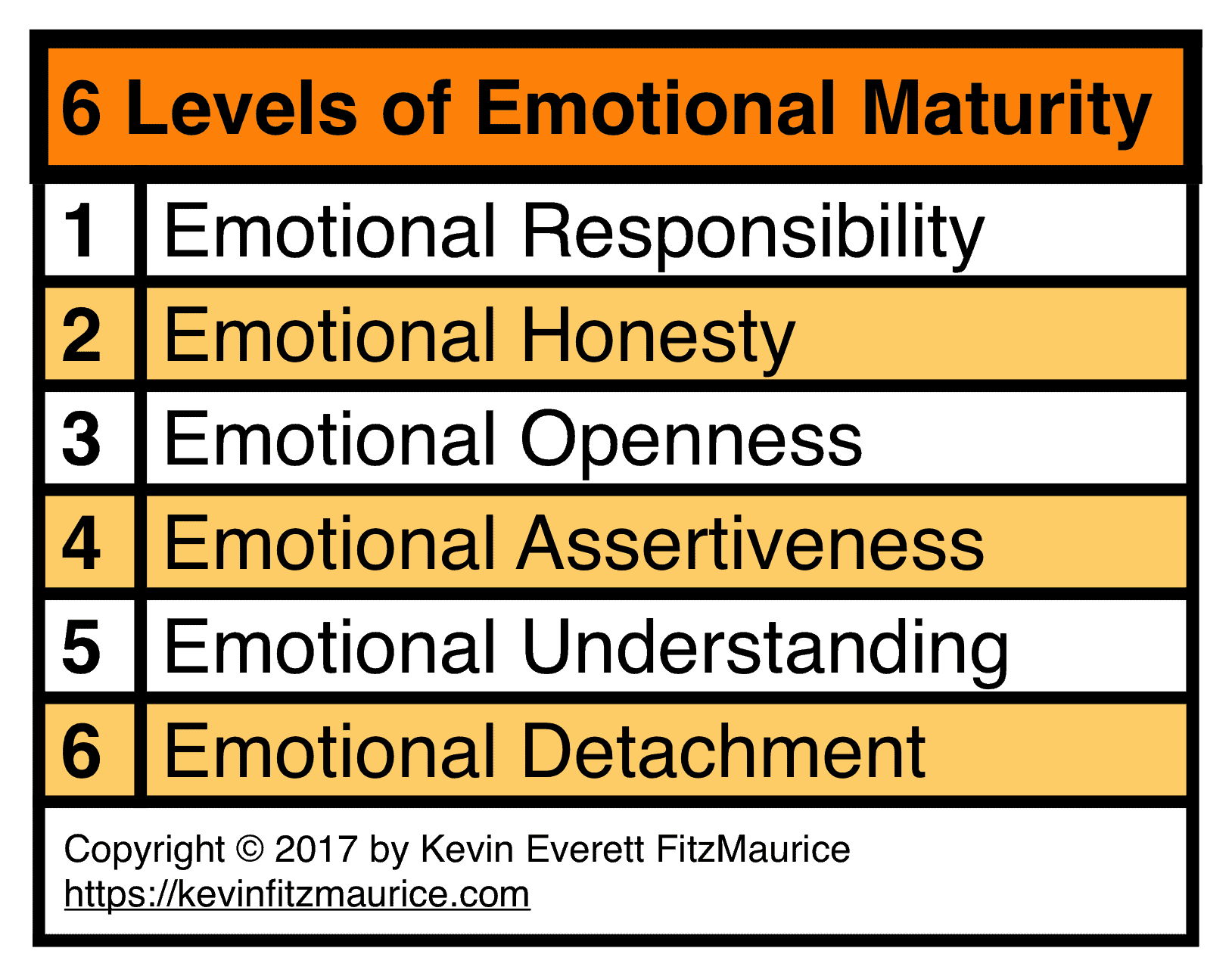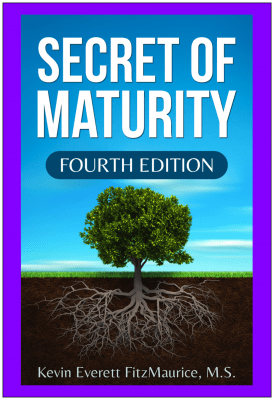Emotional Maturity Is Your Choice for Your Happiness
- 99¢ Discover The Secret of Maturity, Third Edition, which includes all the information on this page and much more.
- Secret of Maturity, 4th Edition is now available in paperback and ebook formats.
“The most beautiful people we have known are those who have known defeat, known suffering, known struggle, known loss, and have found their way out of the depths. These persons have an appreciation, sensitivity, and an understanding of life that fills them with compassion, gentleness, and a deep loving concern. Beautiful people do not just happen.” —Elisabeth Kübler-Ross
“Things can never touch the soul, but stand inert outside it, so that disquiet can arise only from fancies within.” —Marcus Aurelius Antoninus, Meditations, Book IV
“We teach people that they upset themselves. We can’t change the past, so we change how people are thinking, feeling and behaving today.” —Albert Ellis
- Read and discover the best diagrams and maps of how people control and manipulate you.
6 Levels of Emotional Maturity
“Because you upset yourself, therefore you, luckily, can practically always un-upset the one person in the world whose thoughts and feelings you control—you!” —Albert Ellis
- The six levels of emotional maturity are presented from lowest to highest.
- However, the interdependence of the levels of emotional maturity makes listing them from lowest to highest somewhat artificial.
- Feel free to reorder the list as suits your needs.
- The six levels are emotional responsibility, emotional honesty, emotional openness, emotional assertiveness, emotional understanding, and emotional detachment.
Table: 6 Levels of Emotional Maturity
- Click for the book on maturity.
- Read for the best understanding of maturity and how to own it.
Level 1 of Emotional Maturity: Emotional Responsibility
- When a person reaches level one of emotional maturity, then he or she realizes that he or she can no longer view his or her emotional states as the responsibility of external forces such as people, places, things, forces, fate, and spirits.
- He or she learns to drop expressions from his or her speech that show disownership of feelings and a helpless or victim attitude towards his or her feelings.
- Expressions such as: “They made me feel…, ” “It made me feel…,” “I made them feel…,” and any others that denote external emotional responsibility are first changed into I statements as opposed to “You…” or blaming statements.
- For example, common expressions are changed from, “You make me so mad when you do that,” to, “I feel mad when you do that because….”
People at this level of emotional maturity regularly use the following two expressions:
- “When you did that, I felt …, because I thought it meant ….”
- “When that happened, I felt …, because I interpreted it to mean ….”
As time and maturity advance, they begin to use even more accurate statements that inhibit the Blame Game, such as:
- “I chose to feel … when you or I did that because I thought it meant ….”
- “I choose to feel … whenever that happens because I choose to think it means ….”
- “I chose to feel … when he, she, or it did that because I chose to think it means ….”
- “I am in the habit of choosing to feel … whenever my or your [mother, father, sister, brother, etc.] say anything to me, because I think it means ….”
- Read for the best understanding of maturity and how to own it.
Level 2 of Emotional Maturity: Emotional Honesty
Emotional Honesty
- Emotional honesty concerns the willingness of a person to know and own his or her feelings.
- This is a necessary step to self-acceptance and self-understanding.
- The issue of resistance to self-discovery is dealt with at this level.
- Resistance issues stem from the person’s conscious and unconscious fears of dealing directly with the critical voices he or she hears inside his or her mind.
Emotional Coping Skills
- When people don’t learn emotional coping skills, they generally lose most interactions with their internal adversary, internal critic, negative self-talk, or hyperactive conscience.
- Therefore, people’s fears of emotional honesty are based on past ego pain from being internally judged as worse than, lower than, or inferior to others.
- People at this level of emotional honesty know how to choose to feel so that they can keep from being hurt.
- They also know how to choose to not interact with their inner accusers by using ignoring, distracting, or redirecting techniques. (For more on ignoring, distracting, and redirecting techniques, see FitzMaurice’s Garden.)
“To thine own self be true.”
- The realization of the old maxim, “To thine own self be true,” is the primary goal at this level of maturity.
- In this context, the meaning of the maxim is that you are always true to what you feel.
- At this level of emotional maturity, you do not hide, stuff, suppress, or repress what you feel, but you honestly experience what you feel.
- You are at least honest with yourself about how you really feel despite what you are supposed to feel.
- As a secondary goal on this level, people learn to locate others with whom they can safely share their real feelings, their real selves, in an accepting and supporting manner.
- At this level, the work is also begun to never again accept self as your behaviors or experiences. If you act like a dog forever, you will still never become a dog.
- Similarly, you will never become stupid from acting stupid. But you might want to focus on switching your stupid thinking for more realistic and effective thinking.
- Read for the best understanding of maturity and how to own it.
Level 3 of Emotional Maturity: Emotional Openness
- This level concerns a person’s willingness to share and skills in sharing his or her feelings in an appropriate manner and at appropriate times.
- Persons at this level experience and learn the value of ventilating feelings to let feelings go, and also the dangers involved in hiding feelings from self and others.
- Self-disclosure is the important issue at this level of emotional maturity.
- Yet, self-disclosure will never be as important as the willingness of the person to be open to experiencing all of his or her feelings as they arise without the critical voices he or she hears inside trying to change, control, or condemn those feelings.
Danger of Suppressing Feelings
- The dangers of suppressing feelings and the value inherent in exploring all feelings and allowing them internal expression are investigated further over time at this level.
- It is important to note that the ventilation of feelings has to be done correctly.
- If it is not your intention to let go of a feeling when you are ventilating that feeling, then you will feed and reinforce that feeling.
- Ventilating feelings can be destructive and counterproductive, or ventilating feelings can be freeing and open up yourself to better options and choices.
Some Emotional Skills at Level 3
- Express to let pass.
- Ventilate to detach.
- Share to let go.
- Stop stewing and start swimming.
Healthy Attitudes Towards Feelings
- At this level of emotional maturity, a person has the openness and freedom to experience any emotion without the need or compulsion to suppress or repress it.
- The suppression and repression of emotions is to protect the ego from harm and to protect the self from the ego pain that comes when the ego is harmed.
- Read for the best understanding of maturity and how to own it.
Level 4 of Emotional Maturity: Emotional Assertiveness
Emotional Assertiveness
- A person at this level of work enters a new era of positive self-expression.
- The primary goal here is to be able to ask for and to receive the nurturing that he or she needs and wants—first from self and then from others.
- He or she asserts his or her emotional needs in all of his or her relationships if it is safe to do so.
- As a secondary goal, he or she also learns how to express any feeling appropriately in any situation. (For example, how to express a feeling without aggressive or manipulative overtones.)
- A person at this level of emotional maturity makes time for his or her feelings–he or she prizes and respects those feelings.
- Such people understand the connections between suppressed feelings, negative stress, and illness.
Some actions that can be characterized as emotional assertiveness include:
- Asking for alone time to contemplate, meditate, and pray.
- Asking for encouragement to complete a task or to achieve a goal.
- Asking for help to grieve a loss.
- Asking for time and space alone to process feelings.
- Asking for understanding and compassion for some unpleasant feelings.
- Asking to be heard out without advice or judgment.
- Being able to accept compliments with a simple, “Thank you.”
- Expressing what you are feeling while giving the other person permission to feel differently.
- Expressing what you are feeling without requiring others to understand or appreciate your feelings.
- Informing others that you are feeling vulnerable and may react poorly under stress or to confrontation for a while.
- Letting someone know you love and care about them in a non-sexual and safe way.
- Offering congratulations to others for their achievements.
- Rewarding positive social behaviors with approval and support.
- Telling someone that you think what he or she did was smart, timely, or important.
- Read for the best understanding of maturity and how to own it.
Level 5 of Emotional Maturity: Emotional Understanding
- Persons on this level of emotional maturity understand the actual cause-and-effect processes of emotional responsibility and emotional irresponsibility.
- Self-concepts are understood to be “the” problem interfering with emotional responsibility.
- Such a person realizes that it is not possible to have a so-called good self-concept without a complementary bad self-concept.
- Because of the nature of knowledge and the formation of self-concepts, such people experience firsthand, that all self-concepts contain their opposites.
- Knowing that one-half of some self-concept duality is still active in him or her even if he or she hide it in darkness (unconsciousness), he or she begins to regularly leap beyond the pitfalls of self-concepts, self-images, and self-constructs.
- This knowledge of the unity of the opposites (of self-concepts and of knowledge) is applied daily to new situations. (For more on the unity of the opposites, read We’re All Insane, Second Edition.)
Other understandings at this level include the following:
- Attempts to capture a moment of self can only kill the self because the self is a living process and not knowledge or memory.
- To reduce the self to knowledge is literally to kill the self.
- Either one has his or her self and is alive and experiencing, or one has found his or her self as knowledge, lost his or her self, is dead, and is remembering, not experiencing.
Free From Self-Constructions (self-concepts & self-images)
- By their very nature, self-concepts are always externally referenced, and therefore, they are the forever perfect targets and hooks for the Blame Game. Knowing that self-concepts are the only hooks that can be used in the Blame Game, people at this level of emotional responsibility remember to work on seeing their own self-concepts and finding release from them.
- Self-knowledge is used to free the self from self-concepts rather than to form more self-concepts to imprison the self in.
- The main work here is a total shift from identifying with any self-concepts to identifying only with the true or natural self as a host.
- Read for the best understanding of maturity and how to own it.
Level 6 of Emotional Maturity: Emotional Detachment
- At this level, the person lives without the burden and snare of self-concepts, self-images, self-constructs, group-concepts, and thing-concepts.
- Such a person is only aware of self as a process, as a sensing being, as an experiencing being, as a living vessel, as unknowable and untrappable—because self is alive and not static or fixed.
- Such a person has died to the life of self as self-concepts.
- True detachment from all self-concepts has occurred.
- Thus true detachment from others has also occurred, which means that absolute emotional responsibility has been achieved (actually discovered).
- Not having self-concepts to defend or promote, this person can remain unaffected by the Blame Game.
- Not having self-concepts to defend or promote, this person can experience unconditional love for their enemies.
(For a method and a plan for overcoming your ego, please read FitzMaurice’s book Ego.)
- Read for the best understanding of maturity and how to own it.
Quotations Various Sources
Listed Alphabetically
“A baby expects to be soothed, but a mature adult soothes themselves.” —Kevin Everett FitzMaurice
“A man’s as miserable as he thinks he is.” —Marcus Seneca
“A wise man will make more opportunities than he finds.” —Francis Bacon
“Adults are experts at self-disturbance and inept at self-soothing.” —Kevin Everett FitzMaurice
“An excuse is a lie guarded.” —Jonathan Swift
“Are you part of the problem or part of the solution?” —Anonymous
“Because you upset yourself, therefore you, luckily, can practically always un-upset the one person in the world whose thoughts and feelings you control—you!” —Albert Ellis
“But let every man prove his own work, and then shall he have rejoicing in himself alone, and not in another.” —Galatians 6:4
“Don’t go around saying the world owes you a living. The world owes you nothing. It was here first.” —Mark Twain
“Each man the architect of his own fate.” —Sallust
“Either do not attempt at all, or go through with it.” —Ovid
“God has entrusted me with myself.” —Epictetus
“Great works are performed not by strength, but by perseverance.” —Samuel Johnson
“If pleasure first, then pain second.” —Kevin Everett FitzMaurice
“If we have not peace within ourselves, it is in vain to seek it from outward sources.” —Francois de La Rochefoucauld
“It is not easy to find happiness in ourselves, and it is not possible to find it elsewhere.” —Agnes Repplier
“It is not in the stars to hold our destiny but in ourselves.” —William Shakespeare
“Luck is where preparation meets opportunity.” —Anonymous
“Man is condemned to be free; because once thrown into the world, he is responsible for everything he does.” —Jean-Paul Sartre, 1905-1980
“Man must cease attributing his problems to his environment, and learn again to exercise his will–his personal responsibility in the realm of faith and morals.” —Albert Schweitzer
“Maturity is doing good for evil.” —Kevin Everett FitzMaurice
“Most folks are as happy as they make up their minds to be.” —Abraham Lincoln
“My philosophy is that not only are you responsible for your life, but doing the best at this moment puts you in the best place for the next moment.” —Oprah Winfrey
“No one has ever gotten to anyone.” —Kevin Everett FitzMaurice
“Not flattered by praise, not hurt by blame.” —Buddhist saying
“Not in the shouts and plaudits of the throng, but in ourselves, are triumph and defeat.” —Henry Wadsworth Longfellow
“Nothing stops the man who desires to achieve. Every obstacle is simply a course to develop his achievement muscle. It’s a strengthening of his powers of accomplishment.” —Eric Butterworth
“Obstacles don’t have to stop you. If you run into a wall, don’t turn around and give up. Figure out how to climb it, go through it, or work around it.” —Michael Jordan
“Pain is inevitable. Suffering is optional.” —Anonymous
“Some pursue happiness, others create it.” —Anonymous
“Teaching the principle of emotional responsibility can be one of the hardest tasks in REBT as clients may have habitually blamed others for their problems and now the therapist is pointing to the true source of their emotional problems–themselves.” —Michael Neenan and Windy Dryden, Rational Emotive Behavior Therapy: Advances in Theory and Practice, p. 43
“The ability to accept responsibility is the measure of the man.” —Roy Smith
“The emotionally mature individual should completely accept the fact that we live in a world of probability and chance, where there are not, nor probably ever will be, any absolute certainties, and should realize that it is not at all horrible, indeed—such a probabilistic, uncertain world.” ―Albert Ellis
“The only disability in life is a bad attitude.” —Scott Hamilton
“The U. S. Constitution doesn’t guarantee happiness, only the pursuit of it. You have to catch up with it yourself.” —Benjamin Franklin
“The weakling gives more evil than he gets. The weak give an eye for an eye or the same amount. The strong give good for evil.” —Kevin Everett FitzMaurice
“The willingness to accept responsibility for one’s own life is the source from which self-respect springs.” —Joan Didion
“There is no man so low that the cure for his condition does not lie strictly within himself.” —Thomas L. Masson
“Things can never touch the soul, but stand inert outside it, so that disquiet can arise only from fancies within.” —Marcus Aurelius Antoninus, Meditations, Book IV
“To a large extent, I can control my feelings and desires and can change them so that I lead a happier existence.” —Albert Ellis and Robert A. Harper, A Guide to Rational Living, Third Edition, p. 247
“We either make ourselves miserable, or we make ourselves strong. The amount of work is the same.” —Carlos Castenada
“We proclaimed you sound when you were foolish in order to avoid taking part in the long, slow, slogging effort that is the only route to genuine maturity of mind and feeling. Thus, it was no small anomaly of your growing up that while you were the most indulged generation, you were also in many ways the most abandoned to your own meager devices by those into whose safe-keeping you had been given.” —Midge Decter
“We teach people that they upset themselves. We can’t change the past, so we change how people are thinking, feeling and behaving today.” —Albert Ellis
“What poison is to food, self-pity is to life.” —Oliver C. Wilson
“Whatever may be, I am still largely the creator and ruler of my emotional destiny.” —Albert Ellis and Robert A. Harper, A Guide to Rational Living, Third Edition, p. 252
“While they were saying among themselves it cannot be done, it was done.” —Helen Keller
“Why is it that people are willing to take responsibility for their happiness or mild sadness but not their severe disturbance or great unhappiness?—why ego of course!” —Kevin Everett FitzMaurice
“Your parents, friends, and culture often encouraged you to damn yourself, others, and the world. In spite of your biology, your family, and your culture, you don’t need to stupidly disturb yourself.” —Albert Ellis
- Read for the best understanding of maturity and how to own it.
Related Pages of Free Information
“Teaching the principle of emotional responsibility can be one of the hardest tasks in REBT as clients may have habitually blamed others for their problems and now the therapist is pointing to the true source of their emotional problems–themselves.” —Michael Neenan and Windy Dryden, Rational Emotive Behavior Therapy: Advances in Theory and Practice, p. 43
- Coping Skills: Free Help
- Counseling Issues: Free Help
- Diagram of the 6 Levels of Emotional Maturity
- Emotional Responsibility: List Pages
- REBT (RT, RET): List Pages
- Recovery Issues: Free Help
- Responsibility Issues: Free Help
- Secret of Maturity, 4th Ed. is now available for Kindle.
- Secret of Maturity, 4th Edition is now available in paperback.
- Read for the best understanding of maturity and how to own it.
- Read and master the life skill of acceptance using the best combination of CBT, REBT, & Stoicism.
6 Groups of Topics Menu
- 1. Pages by Topic
- 2. Fast-Facts by Topic
- 3. Quotations by Topic
- 4. Poems by Topic
- 5. Scripture by Topic
- 6. Websites by Topic
- Read and master the life skill of acceptance using the best combination of CBT, REBT, & Stoicism.
9 Skills & Topics Menu
- 1. Anger Skills & Topics
- 2. Blame Skills & Topics
- 3. Communication Skills & Topics
- 4. Coping Skills & Topics
- 5. Counseling Skills & Topics
- 6. Praying Skills & Topics
- 7. Recovery Skills & Topics
- 8. Responsibility Skills & Topics
- 9. Thinking Skills & Topics
- Read and master the life skill of acceptance using the best combination of CBT, REBT, & Stoicism.




